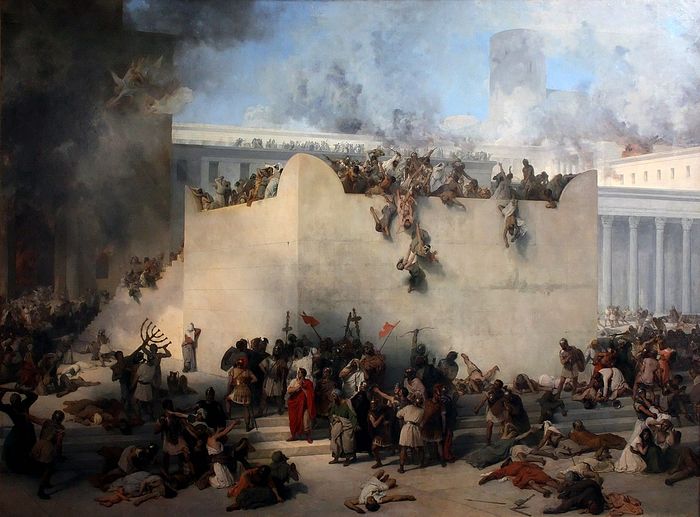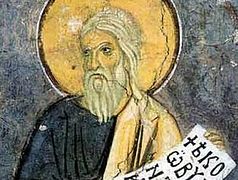Finally in our dialogue with our Jewish neighbours we look to the patterns and lessons from Jewish history as interpreted by the Hebrew Scriptures. Thinking about the catastrophe that befell Israel in 70 A.D. when the Temple was destroyed and the people of Judea scattered through all the world, I would like to make two points.
The first point involves the promises of God made to Israel through the prophets. The promise was made over and over again that God would bring Israel back from the lands of their captivity after the disaster of 586 B.C., and would raise up the Davidic Messiah under whom they would finally find peace and security. Thus Isaiah 51:11f: “The ransomed of Yahweh shall return and come to Zion with singing; everlasting joy shall be upon their heads; they shall obtain joy and gladness, and sorrow and sighing shall flee away…Behold, I have taken from your hand the cup of staggering; the bowl of My wrath you shall drink no more, and I will put it into the hand your tormentors”. Thus Isaiah 60:9f: “The coastlands shall wait for Me, the ships of Tarshish first, to bring your sons from far, their silver and gold with them, for the Name of Yahweh your God, and for the Holy One of Israel, for He has glorified you. Foreigners shall build up your walls, and their kings shall serve you, for in My wrath I smote you, but in My favour I have had mercy on you.” Thus Jeremiah 3:14f: “Return, O faithless children, says Yahweh, for I am your master. I will take you, one from a city and two from a family, and I will bring you to Zion. And I will give you a shepherd after My own heart who will feed you with knowledge and understanding. At that time Jerusalem shall be called the throne of Yahweh, and all nations shall gather to it”. Thus Jeremiah 30:3f: “Behold, days are coming, says Yahweh, when I will restore the fortunes of My people Israel and Judah, and I will bring them back to the land which I gave to their fathers, and they shall take possession of it. Strangers shall no more make servants of them, but they shall serve Yahweh their God and David their king whom I will raise up for them”. Thus Ezekiel 37:21: “Thus says the Lord Yahweh: Behold I will take the people of Israel from the nations among which they have gone and will gather them from all sides and bring them to their own land and one king shall be king over them all…My servant David shall be king over them, and they shall all have one shepherd…They shall dwell in the land where your fathers dwelt that I gave to my servant Jacob; they and they and their children and their children’s children shall dwell there forever, and David My servant shall be their prince forever”.
The promise, plan, and progression are clear—after the return from the Babylonian exile Israel is regathered to the Promised Land, where the Davidic King Messiah reigns over them, and under his rule Israel is finally safe from future threat. Note: the return from the Babylonian exile forms the background for this regathering and Messianic safety. If Jesus was the promised Messiah and if the Kingdom of God was not of this world (as He taught), then all was fulfilled as the prophets foretold: after the Babylonian exile, Israel returned to their land, the Messiah came on time, and established a Kingdom of transcendent spiritual peace. But if Jesus was not the Messiah—if the Messiah is still yet to come—then the words of the prophets proved false, for the Messiah did not come on time after the Babylonian exile. After the Babylonian exile, Israel was indeed regathered after the catastrophe of 586 B.C. but then yet was again scattered after the even greater catastrophe of 70 A.D. This post-70 A.D. thus represents the terminus ad quem for the coming of the Messiah. For the prophets did not simply promise that God would send the Messiah, but them He would send the Messiah after the return from the Babylonian captivity.
The second point involves the cause of the catastrophe of 70 A.D. when the Temple was razed, Jewish nationhood lost, and its people led captive to all nations (Luke 21:23-24). The Law of Moses contains God’s covenant with Israel, and in this covenant God promised to bless His people with prosperity, security, victory, and peace if they would obey Him (Deuteronomy 28:1-14). He also promised that if they disobeyed Him and broke His covenant, He would curse them, sending upon them drought, famine, pestilence, and defeat, culminating in the scattering of the nation to the four corners of the earth (Deuteronomy 28:15-68)—indeed, God would “scatter them among all peoples, from one end of the earth to the other” (v. 64). This theme and threat was the constant theme of the prophets: obedience would bring prosperity and security, while disobedience would bring disaster and exile.
The events of 586 B.C. proved the truth of the prophets’ words and the reality of the divine threat. Israel disobeyed God, filling the land with injustice and turning from God to idols, and for these sins God allowed the Babylonians to destroy the Temple, destroy their nation, and take the majority of the people into exile. This exile lasted until 538 B.C., when under Cyrus the Persian as many as wanted to could return home to begin to rebuild the shattered nation and its Temple.
Given this covenant with its cause-and-effect of obedience leading to victory, and disobedience leading to defeat the question arises regarding the cause of the unprecedented defeat of 70 A.D.—specifically what disobedience, rebellion, and sin could have caused that catastrophic defeat. A view of history which excludes the cause-and-effect promised in the Mosaic covenant will not seek any spiritual cause at all, but will root the disaster solely in political and military concerns. But as we have seen, Israel was not like the other nations, and its fortunes were determined by their obedience or disobedience to their covenant Lord. So, the question remains: what disobedience in Israel prior to 70 A.D. could have caused that disaster?
The Christian answer, based on the words of Jesus, is clear: Israel suffered such a disaster because it rejected its Messiah, both at the time of the crucifixion and in the generation following when Israel had a chance to repent of its national repudiation of Christ. The Lord said so plainly: “The days will come upon you when your enemies will cast up a bank about you, and surround you and hem you in on every side, and dash you to the ground, you and your children within you, and they will not leave one stone upon another in you, because you did not know the time of your visitation” (Luke 19:43-44). If this Christian answer is rejected, what other answer is left? The disaster that befell Israel in 70 A.D. was much greater than the disaster of 586 B.C., for after the latter disaster the Temple was rebuilt within a hundred years, while even now the Temple which was destroyed in 70 A.D. has not been rebuilt. Accordingly, the sin which led to the disaster of 70 A.D. must have been much greater than Israel’s pre-exilic idolatry. If one takes seriously the words of the Mosaic Law then one must conclude that Israel did something of unprecedented enormity to warrant such a disaster. Only the Christian answer fits: Israel rejected its Messiah and paid the terrible penalty.
When one situates the disaster of 70 A.D. within the covenantal framework of the Law and the Prophets, the lessons of history are clear: Jesus of Nazareth was the promised Messiah. He came on time as the prophets said, and His rejection caused the greatest disaster ever to befall the Jewish people.





A truly terrific article. You present the whole saga clearly and concisely.
It cannot reasonable be explained other than as presented - from a spiritual and Biblical perspective.
Thank you.Have a God blessed Nativity!
In Christ, Fr James